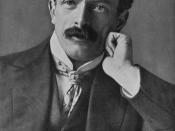How and with what success has liberalism sought to emancipate individuals?
Liberalism has always fought for the rights of the individual as it was one of the founding principles of the liberal ideology according to John Locke in the 17th century. As well as the rights of the individual, John Locke also saw freedom and toleration as two other key components of liberalism. This question demands, however, an examination of the success of liberal policies towards the emancipation of the individual. During the course of this essay one will examine how liberalism has freed the individual during the 19th Century under Gladstone and during the liberal reforms of 1906-1912. Finally one will conclude that in concordance with R. Rurup that, "Liberalism is regarded as the truest protagonist of emancipation." Reforms enacted by liberal governments, often did provide huge improvements in both living standards and education however, they did not always fully emancipate the individual.[1:
R. Rurup, Leo Baeck Institute Yearbook, (1975) 20 (1): p. 59]
First and foremost, one must look at the great liberal reforms of the 19th Century, enacted during both the first and second ministry of William Gladstone. Vincent, claims that, such reforms that, "Maximised individuality," were, "genuinely liberal." The first reform that most clearly emancipates the individual during Gladstone's premiership was the Elementary Education Act of 1870. This as Heywood argues was seen as a way out in the 19th Century form the, "Spread of slums, poverty, ignorance and disease." The act established the English elementary schooling system, as children up to the age of 12 were made to attend primary school. It created a codified curriculum with six 'standards' or ages 5-12. Strict punishments were laid upon parents who refused to send their children to school. Whilst, this bill created the provision of elementary...


